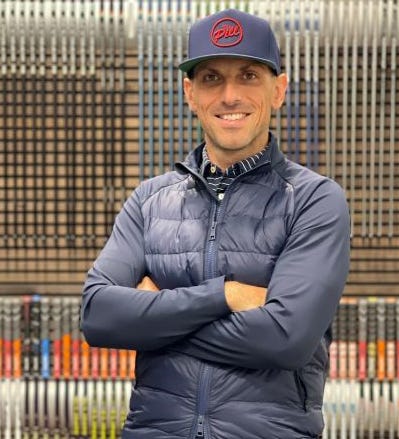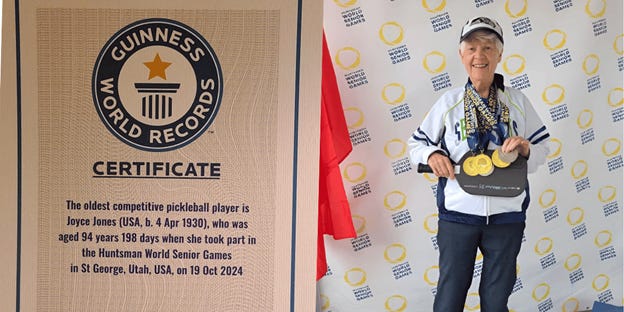Paul Nagi is First Assistant Golf Professional at Westlake Country Club in Austin, Texas.
Age-defying Athletes spoke with Paul recently about advice for men and women over age 50 who would like to trod the Cart Path.
Paul offered his “two rules for golf”:
“Rule 1 – Be kind to yourself. Golf is a performance piece, so you are expected to perform. But you won’t always, especially at first. You need kindness to remain open to the game and to be creative. When you’re angry, creativity shuts down.”
Creativity? Yes, it’s needed to solve the problems of the game. It’s also necessary to develop and maintain a positive golf brain.
What’s more, this is especially excellent advice, since golfers – as described in The Elixir of Sport – are the Age-defying Athletes most likely to feel the misery of inconsistency.
“Rule 2 – Swing hard in order to achieve your potential, to live up to your optimal capabilities.”
In other words, those who want to learn golf should approach it with energy and commitment – no half-hearted efforts. See what you might achieve. You may surprise yourself.
What advice do you have for someone over age 50 who hasn’t played golf much – or ever – but would like to get into the game?
“I would say make sure you have friends who play. If there is no reason to play, you won’t stick with it.
“Sometimes, people want to begin golfing as a tool for business and they learn in groups. Rarely do they take up golf alone.”
What should this rookie golf player expect?
“In a round of golf, expect maybe only three good shots. But those are the shots that will keep you coming back.
“People assume [playing golf] should look better than it does. But remember, even the PGA touring pros hit spectators in the gallery with poor shots. Everyone hits bad shots.”
Hence, Nagi’s first rule of golf: be kind to yourself.
What should newcomer golfers look for in an instructor or clinic?
“Look for someone who will also teach you about the culture of the game…to help you become comfortable playing with more skilled players.
“I tell beginners that it’s not necessary to hit every shot, or even to play every hole…as long as you are keeping up with the group, you will be fine. Just keep moving.”
Paul continued: “Look for specialty areas in the coach’s background. For instance, does he or she have a focus on golf for business? What about golf for women or for anyone who didn’t play a lot of sports as a kid?”
In other words, find a fit that makes sense for you.
“If the coach shows a genuine interest in you,” he added, “that’s important. My coaching philosophy is that everyone can learn the game and can enjoy playing.
“If a coach, on the other hand, pays attention only to the most attractive student in class, that’s a signal to move on.”
How should the rookie player obtain initial equipment?
“It’s even more important for rookies to be fitted,” Paul claimed, “especially women and kids. Today, major brand golf sets are not properly weighted for later life starters.”
What are the most important aspects of the game for a latecomer newcomer?
“Score doesn’t matter unless the golfer is trying to achieve something such as an amateur ranking.”
He advises that “Instead of keeping an overall score, just count the number of good shots.”
Another recommendation concerns fitness. “Pair golf with Pilates®,” Paul encourages, “because the way you move in Pilates really helps with proprioception and golf swings, turns, and the like.
“It also helps develop the small muscles important to golf,” continued Coach Paul. “The more you build the right muscles, the better.”
What mistakes should the rookie avoid?
Taking the game and oneself too seriously. Or, as his PGA website notes: “Coach Paul believes anyone can improve in the game as long as they have a good sense of humor about themselves.”
“Go out and play as soon as you can. But remember, that if you have some fantasy vision about yourself that will not come true on the course, the game is not necessarily fun … it’s stressful.”
WIIFY?
Remember Paul’s first rule: be kind to yourself.
During golf, rowing, ping-pong, or any of the other innumerable sports pursued by Age-defying Athletes, players will experience moments of humiliation, devastation, depression, and any other negative emotion you care to contemplate.
Don’t contemplate them! Give yourself a break. Take a moment to recall all your other groovy achievements.
And recall the wisdom of the Age-defying Athletes Project (ADAP) house coach: “Golf [or tennis or pickleball or tri-athlons, etc.] is a journey, not a destination.”
Just get out there and travel!
Post Script
And speaking of pickleball…
The Dink reports that 94-year-old Joyce Jones is the oldest competitive pickleball player in the world.
The e-newsletter writes:
Joyce Jones just earned a spot in pickleball royalty. Her efforts at the Huntsman World Senior Games awarded her a new World Record.
Guinness World Records recently recognized Jones as “The oldest competitive pickleball player.” She learned to play pickleball from one of the game’s inventors, Joel Pritchard, more than 44 years ago.
Jones competes at the USA Pickleball Nationals Championships every year, including this past year in Arizona. Listen to Joyce tell her story of learning the game and what pickleball has meant to her life over the past four decades.
Watch that video and renew yourself!!





